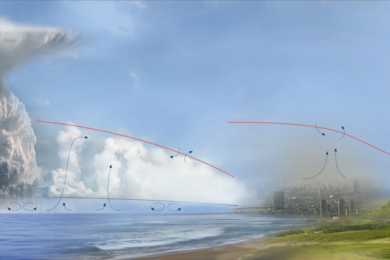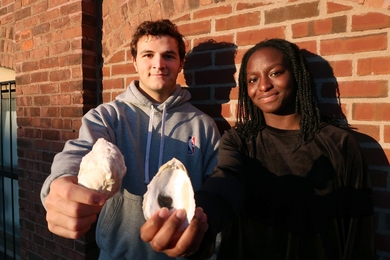On behalf of MIT Lincoln Laboratory, MIT President Charles M. Vest accepted the Secretary of Defense Medal for Outstanding Public Service May 8. The award was presented at Recognition Day ceremonies marking Lincoln Lab's 50th anniversary.
Ron Sega, director of defense research and engineering in the Department of Defense, gave Vest the medal during outdoor ceremonies at Lincoln Lab's Lexington facilities. Sega said the medal, usually given to an individual, has been awarded to an organization only twice in its history, and both times to Lincoln Lab: first at its 25th anniversary and again last week at its 50th.
According to the citation by Secretary of Defense Donald Rumsfeld, "The Laboratory's numerous contributions to the development of critical defense capabilities enhanced the nation's security posture and provided United States forces a decisive advantage. Lincoln Laboratory's ability to pioneer long-lasting contributions to the development of advanced technologies, and the successful transition of these technologies to industry, strengthen the national security industrial technology base."
The ceremonies were led by Lincoln Lab's director David L. Briggs. Walter E. Morrow, director emeritus, reflected on the lab's 50-year history.
The Recognition Day ceremony was followed by the third annual Dr. Eugene G. Fubini National Defense Technology Lecture, given by Harold Brown, Secretary of Defense under Jimmy Carter and president of the California Institute of Technology from 1969 to 1977.
THREATS TO SECURITY
A biological warfare attack on the United States is more likely than a ballistic missile attack from China, Russia or North Korea, but "how much priority you put on defending against it depends on how much you think you can do," said Brown.
"Organizing for [a biological attack] is equally important and equally difficult" as creating technology to defend against it, he said.
Although radicals and terrorists are not the same kind of "nation-destroying" threat that the Soviet Union was perceived as during the Cold War, Brown said we need to band with our allies in Europe to counter this latest threat. Even though the European nations do not spend close to the same proportion of their gross national products on military weapons as the U.S., they do spend money on peacekeeping forces and foreign aid. "If we are going to be in these things together, we need to participate in what they do best," he said.
Brown, a former member of the President's Science Advisory Committee, director of defense research and engineering in the Department of Defense and Secretary of the Air Force, was awarded the Presidential Medal of Freedom in 1981 and the Fermi Award in 1993.
ACCURACY FROM AFAR
Brown listed the technological advances which, over the past 50 years, have dramatically increased our accuracy at seeking out and destroying military targets. "Change in the form of new defense technology is vital in forcing change in the overall environment in foreign policy and in dealing with specific issues and specific adversaries," Brown said. "Without institutions such as Lincoln Laboratories, none of the advances central to change will occur."
Technological advances have allowed U.S. military forces to deliver, from great distances, highly lethal payload on a subject whose location is known. But what happens when those targets fall on civilian populations, such as arsenals within houses of worship, hospitals or schools? "Our technology may allow us to detect that fact, but it doesn't help us know how to deal with it," he said.
Created in 1951 as an MIT federally funded research center, Lincoln Lab built a reputation for pioneering advanced electronics in air defense systems. The lab's mission is to apply science and advanced technology to national security problems. The scope has broadened from the initial emphasis on air defense to include space surveillance, missile defense, battlefield surveillance and identification, and communications and air traffic control, all supported by a strong advanced electronic technology activity.
The lecture series is named for Fubini, Brown's friend and colleague who died in 1997. Fubini spent years in research and the defense electronics industry before serving in the Department of Defense. He was a strong advocate for the use of advanced technology for military command, control and intelligence systems.
A version of this article appeared in MIT Tech Talk on May 15, 2002.






